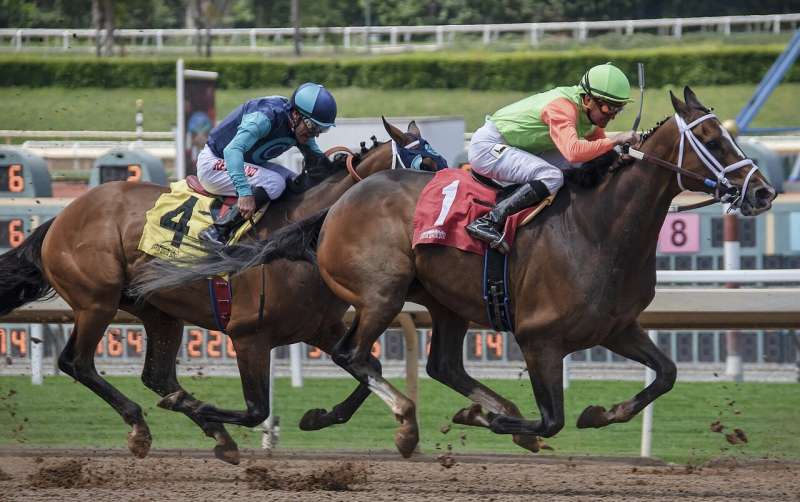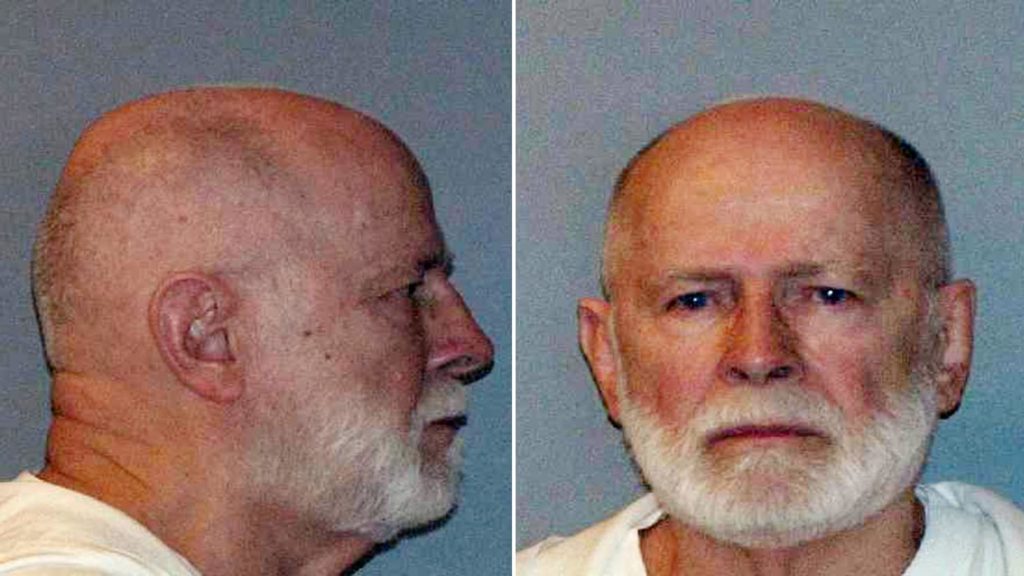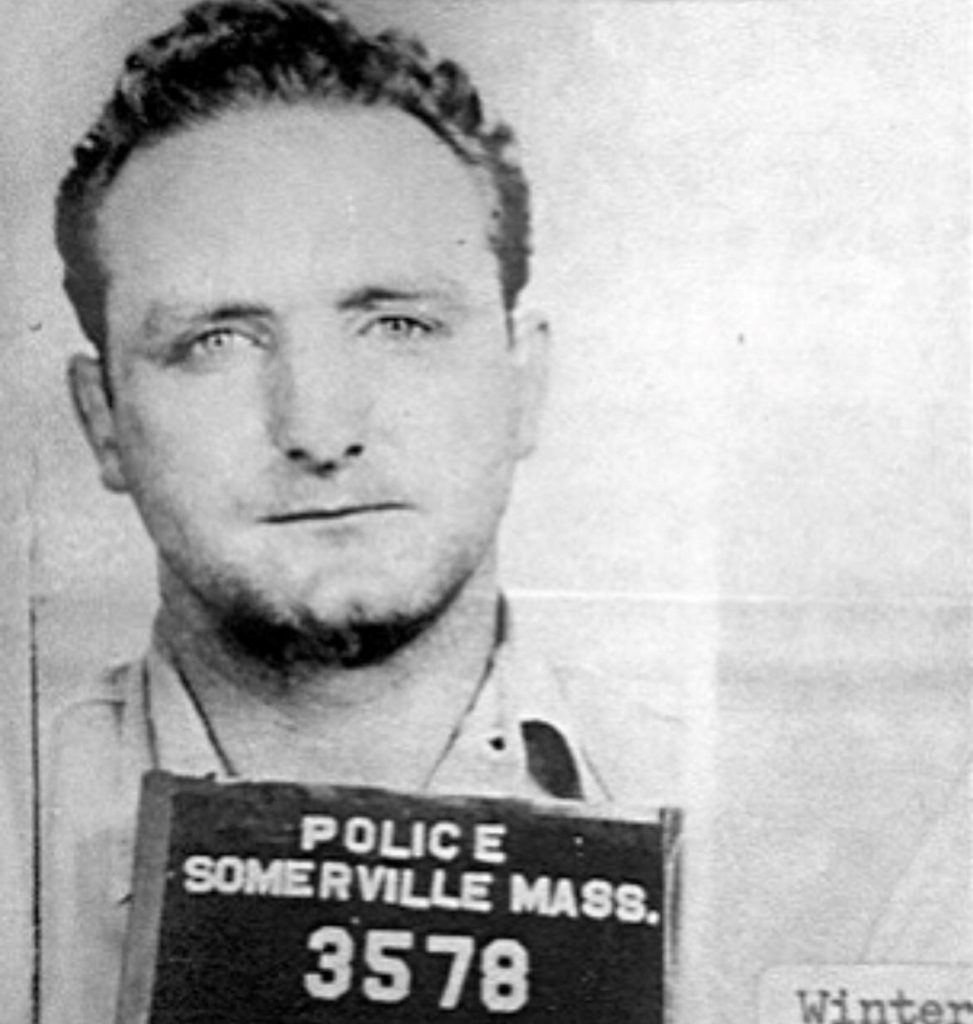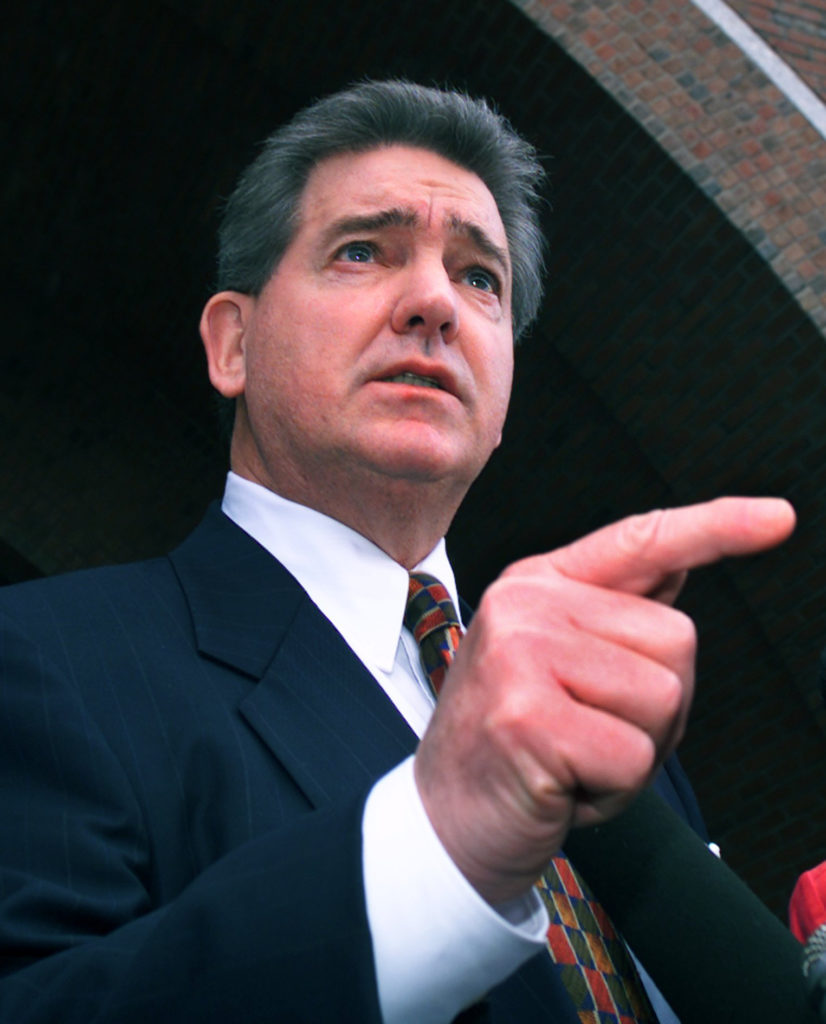Recently released FBI documents tie Whitey Bulger to horse race-fixing scheme
Rogue FBI agent protected Boston mobster from indictment

The recent release of FBI documents about the late mobster James “Whitey” Bulger does more than shed light on a 40-year-old horse race fixing and bribery case. It also recalls the shameful saga of how former Boston FBI agent John Connolly for years protected Bulger and Bulger’s murderous cohort, Steve Flemmi, from prosecution.
The FBI posted on its public records website The Vault exactly 300 pages of intelligence reports from the mid- to late 1970s, first about Bulger and Boston’s Winter Hill Gang extorting “juice” payments for illegal street loans, then shifting to the Mob’s scheme to fix races at East Coast pari-mutuel horse tracks.
The heavily redacted documents name Bulger and gang leader Howard Winter among the suspects conspiring to force loansharking payments from people in Boston from late 1974 to early 1975. FBI agents detailed how some victims consented to wear wires and permit wiretaps on their phones to record incriminating threats of violence for nonpayment by several gang members.
But further into the file, the focus of the intelligence reports abruptly swings from loansharking to a notorious case that resulted in indictments in 1979 of Winter and 20 others — including most of his gang but not Bulger or Flemmi — for alleged racketeering, sports bribery and conspiracy in the fixing of thoroughbred horse races.
The FBI reports bring renewed relevance to disclosures about Bulger, Flemmi and Connolly in the 2000 book Black Mass: The True Story of an Unholy Alliance Between the FBI and the Irish Mob, by Dick Lehr and Gerald O’Neill.
According to the authors, in 1978, Anthony “Fat Tony” Ciulla, a convicted race fixer and major player in Winter’s race-fixing plot, agreed to serve as a prosecution witness to avoid a long prison term. Ciulla said in open court that among his “partners” in the fixing scheme were Winter, hitman John Martorano, Bulger and Flemmi.
However, Connolly was determined not to see Bulger and Flemmi indicted in the race-fixing case. During the late 1970s and into the 1980s, FBI agent Connolly served as Bulger’s “handler,” or protector, maintaining Bulger as a confidential informant for the FBI on organized crime. Connolly’s information led to convictions of some Mafia leaders in Boston, embellishing his reputation with the FBI. For his part, Connolly regularly tipped off Winter Hill members about FBI informants, some of whom were murdered as a result.
This scandalous cooperation culminated in 1982 when Connolly slipped information to Bulger and Flemmi that John Callahan intended to inform on them about the 1981 killing of Roger Wheeler, the head of World Jai Alai in Oklahoma, by the Winter gang. Bulger, Flemmi and Martorano soon participated in murdering Callahan.
Bulger and Flemmi were later charged with 18 murders, 11 of which occurred while Connolly and the FBI protected them as informants.

Bulger, secretly told by Connolly he’d be indicted on racketeering charges in 1994, fled Boston and remained in hiding until his arrest in Santa Monica, California, in 2011. A judge in 2013 sentenced him to two life terms on racketeering charges and taking part in 11 murders. His fellow inmates beat him to death in a federal prison in West Virginia in 2018.
Connolly received a 10-year federal sentence in 2002 for protecting Bulger and Flemmi, and a 40-year sentence for murder in a Florida state court in 2009. Now 80 years old and suffering from terminal cancer, he received a medical release from prison in February.
Flemmi’s protector was FBI agent H. Paul Rico, who allegedly helped arrange Wheeler’s homicide in Tulsa, Oklahoma, with Bulger, Flemmi and Martorano. Flemmi pleaded guilty to 10 murders and was sentenced to life in prison in 2004. Rico, charged with murder in the Wheeler case in 2003, died after his extradition to Oklahoma in January 2004.
The new files on Bulger indicate that the FBI had information as early as the mid-1970s that he may have been in on the race fixing conspiracy, but he escaped indictment. According to authors Lehr and O’Neill, this was Connolly’s doing.
The federal prosecutor in the race fix case, Jeremiah T. O’Sullivan, had already added Bulger and Flemmi to the list of those to be indicted in January 1979. Ciulla had already testified that Bulger and Flemmi were among six associates of Winter who shared in the money won via race fixing.
Connolly and his FBI colleague John Morris told O’Sullivan they needed Bulger and Flemmi free, with the prospect of gaining incriminating information on a big fish —Gennaro Angiulo, underboss of New England’s Patriarca crime family. O’Sullivan consented to dropping them from formal indictment, instead making them unindicted co-conspirators.
As recounted by Connolly himself in Black Mass:
“It turned out, added Connolly, that the government had the goods on Bulger and Flemmi. ‘Ciulla had actually buried them, apparently in his grand jury testimony.’”
“… After getting back to the FBI with the good news, O’Sullivan, continued Connolly, required that Bulger and Flemmi promise not to even think about taking out Ciulla. ‘He told me that as a condition of their being cut loose from the race-fix case, they had to give their word that they would play no role in hunting down Anthony ‘Fat Tony’ Ciulla.’”
Ciulla, a national expert in bribing jockeys, practically ran the race fix operation with Winter’s investments and was crucial to the federal investigation. Back in 1972, Ciulla had been convicted of conspiring to fix races at the Suffolk Downs track in East Boston.

This time, caught again and facing a stiff prison sentence, Ciulla agreed to testify about the scam in exchange for avoiding a criminal indictment (he was named an unindicted co-conspirator).
The incredible scheme, which ran from December 1974 to November 1975, involved fixing horse races at legal racetracks by bribing scores of jockeys, trainers, owners and race officials to throw the contests. Jockeys would mostly receive $400 to $500 bribes to slow down their horses to let others win.
The plotters even bought a thoroughbred horse, called “Spread the Word,” and bribed its riders to hold it back to look like a poor racer. After they laid heavy bets on the horse, the animal, now with longer odds against winning, did “win,” hoofing down the stretch against corrupted jockeys, at New Jersey’s Garden State Park on February 8, 1975. The conspirators split $80,000 won on the race. They would net at least $1.3 million in all, federal prosecutors said.
The new FBI documents pertaining to the RICO/sports bribery probe, which took place from 1976 to 1978, focus on Winter, Bulger, a Las Vegas resident and unlicensed handicapper named Robert Martin and others whose names are censored.
Winter and his conspirators enlisted Martin and other illegal bookmaking contacts based in Las Vegas, Elliot Paul Price and Melvin Goldenberg, who knew how to move money bet on horses in fixed races, thereby cheating both illegal bookmakers and the legal racetracks.
The FBI file also mentions Las Vegas sports handicapper and Stardust hotel executive Frank Rosenthal, an active associate of the Chicago Outfit found guilty in 1960 of trying to bribe college basketball players. Agents said Rosenthal and Martin at the time operated the largest illegal lay-off sports betting operation in the country. The agents figured that the conspirators must have first obtained the permission of Anthony Salerno, underboss of the Genovese crime family of New York, to lay their illegal bets through Las Vegas bookies.
Winter masterminded the conspiracy, and he and his partners provided the financing from the gang’s roost in Somerville, Massachusetts. The FBI file describes how the scheme worked. Basically it set up an almost sure thing — bribing jockeys so their horses would not place in the top three for win, place or show bets, so the schemers could bet on the fixed racers.
“The Las Vegas people would, through their contacts, move a certain amount of money on a given horse, which was handicapped by (redacted) in a fixed race. The horse would more than likely be one of the three or four remaining ‘live horses’ meaning that these horses in fact had a chance to actually win the race. The other horses would theoretically be stopped from placing in either the win, place, or show positions through bribery of either a jockey, trainor (sic), or owner or other racetrack official. The bets which would be placed with the illegal bookmakers would generally be across-the-board wagers, that is monies placed in the win, place and show position. This would ensure an almost certain return on the monies which would be bet illegally.”
The contacts in Las Vegas would move as much money as possible on a fixed race at the appropriate track and telephone Winter in Somerville to tip him or someone in his gang off about the track and the fixed race. Winter’s people would then make illegal wagers through Las Vegas and assign runners to place bets at the pari-mutuel tracks where fixes occurred. In Las Vegas, Martin (who had lost his Nevada gaming license) worked as a silent partner in the Churchill Downs Race & Sports Book, Price at the Riviera Hotel and Goldenberg at the Tropicana.

In one case, according to the FBI documents, a conspirator gave a horse called “No Hurry” a depressant before a race at the Pocono Downs track in Pennsylvania, after the jockey had stated he, “could not hold this horse because it was so superior to all the other horses in this race.” After the horse ran a slow race, suspicious track officials took a urine sample from it that later tested positive for a depressant drug, leading to the arrest of the alleged drugger.
In the end, they fixed 20 races at six Eastern tracks: Suffolk Downs, Pocono Downs, Rockingham Park in Salem, New Hampshire, Lincoln Downs in Rhode Island, and the Atlantic City Race Track and Garden State Park in New Jersey. A federal court convicted Winter in 1979 and sentenced him to 10 years in federal prison. Four other defendants received shorter sentences.
Feedback or questions? Email blog@themobmuseum.org





